 © JumpStory
© JumpStory
Celebrating the centenary of Lithuanian Olympic sports, we share a publication prepared by Gediminas Kalinauskas on the history of the Lithuanian men's football team's participation in the 1924 Summer Olympic Games in Paris.
The original article was first published in the newspaper "Sportas" supplement "Futbolas: 7 dienos", no. 28 and 29.
***
The first Lithuanian Olympians - football players
There are many prominent pages in our sports history. We have a large number of world, Olympic, and European champions and medalists. However, it is hard to imagine now that the founders of the entire sports movement were football players, the first to pave the way to the biggest sports forums - the Olympic Games.
One of the most significant events in our sports history - the Olympic debut - was celebrated on May 25th and turned 100 years old.
By the occasions of previous anniversaries, there has been already quite a lot written in the press and various publications. However, many important things that need to be immortalized in football history have escaped the eyes of many historians. Therefore, this time, more attention is paid to some undisclosed documents and the most important moments of the matches between the Lithuanian and Swiss national teams.
Already on November 25, 1923, the first issue of the "Sportas" magazine emphasized: "We all know well what a difficult time our sport is going through. At a time when other nations are sending their best athletes to the World Olympics in Paris - we, Lithuanians, can only accompany them with our thoughts and wait another 4 years until the next Olympics. Why? Don't we have good-educated football players, basketball players, lawn tennis players, and so on? After all, if our athletes cannot yet compete with the old Olympians, this would still be an opportunity to look and learn, to come back and tell our sports youth about everything that was seen."
It was also mentioned there that the Central Committee of the Lithuanian Sports League did not bother to convene a meeting to form the Lithuanian Olympic Committee. Such committees were already established in many countries around the world. They were responsible for preparing athletes for the games, allocating funds and subsidies, promoting Olympic goals and ideas.
In the following article, Jurgis Šulginas talks about the necessity of sending the football team and promises to express his opinion on the squad later. The author is not afraid that there will be a "dry" result.
A rare coincidence, but on November 25th in Kaunas, there was also a historical congress on Lithuanian football to address important football issues. The Football Committee of the Lithuanian Sports League first proposed the need to establish its own Lithuanian Football League (similar to the Federation and Association). Among many issues, there was also mention of the team's participation in the 1924 Olympic Games.
Unfortunately, the new football institution had to deal with organizational issues for several months. In addition, there was a conflict with the Sports League, which also did not give up football matters. Therefore, the Football League alone did not have much to do regarding participation in the Olympic Games.
Judging by the sequence of events, football leaders (S. Darius, S. Garbačiauskas, and V. Balčiūnas) worked energetically. On March 29, 1924, a telegram was sent to the Olympic Games Organizing Committee regarding participation, and a list of players was named: Gvildys, Krigeris, S. Darius, Deringas, Čipėnas, L. Juozapaitis, Bartuška, Razma, D. Žilevičius, S. Garbačiauskas, Getcas, Humfeldas, K. Krukas, Hardingsonas, S. Sabaliauskas, Balčiūnas, Mikučiauskas, Aronovičius, Gelermanas, Strazdas, Barstatas, Janušauskas. As we can see, there are a few inaccurate surnames and missing...
On April 14, an additional letter was sent to the FIFA headquarters (the first was on April 1), confirming the establishment of the LFL and participation in the Olympic Games. The League statutes were attached. It was announced that S. Garbačiauskas would participate in the FIFA congress (May 24-28), he would be the Olympic Games correspondent.
Three days later, E. Ferster, as president of the LFL, wrote to the Klaipėda football district about the upcoming match between the Kaunas and Klaipėda teams on May 11 in Kaunas, as the League's CK resolution declared that "representative includes 2 defenders, 1 center-back, and 3 forwards from Klaipėda."
Meanwhile, the day before in the Olympic Committee headquarters, they drew lots. Among the 23 flags of the countries, there was also our country's, represented by S. Garbačiauskas. The meeting was opened by FIFA President M. J. Rimet. He announced that the teams of 7 countries will have to be "knocked out."
The tables of the countries' names were put into a basket, and Rimet first drew out 9 tables, which meant that the teams of these countries would directly enter the next stage of the competition. They were Holland, Romania, Bulgaria, Ireland, Luxembourg, Belgium, Egypt, Latvia, and France. Then the pairings were made - with 14 countries. At 6:26 pm, it was revealed that Lithuania's opponent would be Switzerland. Then the dates and meeting places were set. This pair had to play on the 25th of May at the "Pershing" stadium. Additionally, the times of three other matches (including one Estonia - USA) were scheduled for 3:30 pm.
At that time, the strong representative of Switzerland was quite modest and said: "It will be much harder for us to play against you than for you to play against us because you know our game and its intensity, and we are not yet aware of your intensity, so I will have to send someone before the match who can recognize what you have played on the spot. Our first match is very interesting to us, and we will be happy to meet you. And if we win at least one goal against you, we will be satisfied and will be able to continue participating."
However, our football leaders at that time knew the Swiss football only from the press. In the list of their team's matches, there were victories of 3:0 against France, 2:0 against Denmark (the finalists of the 1908 and 1912 Olympics), and even 5:0 against the Netherlands. As is known, the Lithuanian team in 1923 played only one match with Estonia (0:5)...
After the draw, our football leaders took some steps to prepare for the Olympics. Therefore, on May 4, they sent a letter to the Citizens' Protection Department:
"As is known, Lithuania is participating in the World Sports Olympics, which is to be held in Paris. Lithuania's participation in the Olympics will elevate the entire Lithuanian sports worldwide. The Lithuanian Football League has decided to send a football team consisting of the best players from Klaipėda and the best players from Greater Lithuania. To get better education and to expand football games better in Lithuania, we have decided to bring a football coach from Austria, P. Hes Ali (born in 1903), the son of Emanuel. Therefore, we have the honor to ask Mr. Director to grant the corresponding permission for 4 months of stay and entry into Lithuania as soon as possible. His earliest arrival will give us the opportunity to better educate and prepare for the World Olympics."
On the same day, a similar explanation letter was sent to the Klaipėda football district. It was urgently requested to gather the Klaipėda team and depart from Klaipėda on the evening of May 9 so that on the 10th, they would play a match with the Kaunas team and a return match on May 11. This was very important as it was planned to take 6 Klaipėda players to the Olympics. Also, all match revenues would be allocated for the team's goals.
Unfortunately, the mission of the young Austrian coach remained unclear as control matches did not take place. The team's situation was also complicated by the fact that the Kaunas footballers had hardly trained before the season. In addition, there were only 4 teams participating in the Kaunas district championship, and they managed to play only two rounds of matches.
Against this background, the main thing was entirely forgotten - financing. It was planned in the winter to send 30 athletes and 3 official persons to the Olympic Games, and expense estimates were prepared several times. However, there was no final decision.
This was remembered incidentally and only at the very last moment. In Kaunas from May 19-22, during the foreign ministers' conference, Lithuanian Prime Minister and Minister of Foreign Affairs Ernestas Galvanauskas learned that they were going to escort their Olympians through Kaunas for the Olympics. The Latvian representative also assured that emissaries from his country would also participate in the Olympic Games. This pushed the leader of our country to make a decision. For this purpose, the Cabinet allocated 10,000 litas, the Ministry of Foreign Affairs allocated 2,000 litas, and the Kaunas Municipality provided 1,500 litas in assistance. So the footballers would have to hurry to manage the paperwork and get ready for the games.
However, a hurried telegram was sent to the Olympic Organizing Committee to postpone the match for one day. However, the response was negative.
In a record short time, the best Kaunas footballers managed to arrange foreign passports, obtain visas to Germany. Some soldiers were found at the training camp and barely had time to change. Notably, the 6 Klaipėda footballers did not make it to the train at 4:55 pm on May 22. Among a splendid Latvian delegation, our compatriots looked simply pitiful. Few brought any substantial snacks with them...
However, the troubles did not end there. After a day's journey, it turned out that transit visas from Belgium were needed at the border. They were only obtained for one footballer returning to the German point, and the journey was delayed for ten hours, continuing just half an hour before the opening of the Olympic Games, half of which needed to be spent on the journey.
The longed-for Paris was reached at midnight just before the Olympic Games, and the footballers only went to bed at 3 am. As later written by the national team footballer S. Razma to Mrs. Garbačiauskienė, they almost didn't sleep, "we had a job to do: wash and iron the pants taken from Kaunas and sew national flags on all knitted jerseys (jerseys were ordered in Paris at the last minute and we only picked them up from the workshop upon arrival)."
The footballers woke up on Sunday morning at 9 o'clock, and an hour later had breakfast. At that time, they received a telegram from the Lithuanian Sports League saying "Hold on!" During breakfast, and later, discussions were held on how to defend themselves, as the opponent was very threatening.
It took an hour to travel (25-30 km) as the stadium was on the outskirts of the city. The dressing room was also chaotic, as the press correspondents were asking not only for the players' surnames but also about Lithuanian sports in general, the knowledge about the country. This raised even greater excitement for the athletes, and there was speculation about how the audience would react, what the result would be. It seems that "our" weather was brought with us, as the rain was pouring. It only stopped raining fifteen minutes before the match.
At 2:25 PM, our team appeared in the field. The attire was beautiful: white shirts with green accents and a collar, national flag pins on the chest, green shorts, and green socks with yellow accents. Among the 10,000 spectators, who warmly welcomed the Lithuanians, the sound of Lithuanian voices could be heard. They spread from the side where the Lithuanian flag hung, next to the shield showing our goals.
A few minutes later, the Swiss team, wearing red shirts and white shorts, appeared. The pre-match warm-up did not last long. The field referee Antonio Scamoni from Italy (linesmen - E. Fabris from Italy and F. Cejnar from Yugoslavia) tossed a coin, S. Garbačiauskas chose the field side, and the ball went to Swiss.
As the final score of the match was 9:0, we will focus only on the most important moments of the game and the impressions of the footballer S. Razma.
The first minutes showed that the Swiss, taller than our players, were a whole head taller in solidity, technique, and tactics. Therefore, it did not take long for the first goal to come. After controlling the ball for three minutes, the opponents earned the right to kick a corner, and the right back P. Sturzenegger scored the first goal without much difficulty.
The siege of our goal lasted five more minutes until the same Swiss player scored his second goal. However, the protocol credited the goals to V Ditrich, who made the pass.
After that, the game equalized. Our players attacked the opponent's goal from a distance, scored with their heads from close range, and earned a few corners. Once R. Ramsejer headed the ball into the goal, probably already out of bounds.
However, at the end of the first half, the Swiss players, feeling the taste of the game, completely dominated our players with beautiful passes and combinations. With two more goals, M. Abeglen and P. Sturzenegger completed a set for them.
The fifth goal scored against our goal took place in the tenth minute of the second half. Its author was M. Abeglen, who soon added another goal. After his removal in the 65th minute, R. Ramsejer converted the penalty.
When our players were barely moving on the field, P. Sturzenegger increased the score with two more shots to 9:0. However, there was no huge disappointment. The game itself was quite beautiful, correct, and instructive. As S. Razma said, the Swiss showed a fast, beautiful, combined game with dozens of variations (!).
It seems the Swiss were preparing especially carefully for the Olympic Games. They lived together for three weeks in a dormitory and trained every day from 2:30 pm, the time allocated for matches.
Already at 8 in the evening, local newspapers were writing about these matches. There were caricatures of V. Bartuška and S. Garbačiauskas. A few days later, the footballers could analyze these matches from film reels. Many moments were shown in slow motion.
The Lithuanian footballers were in Paris for another 10 days and on June 4, they played a friendly match with Egypt, which had defeated Hungary 3:0 in the round of 16, but lost 0:5 to Sweden in the quarter-finals. Meanwhile, our opponent Switzerland secured their path to the final with 2:1 victories against Czechoslovakia (after extra time), Italy, and Sweden but lost 0:3 to Uruguay in the final.
However, these Olympic Games left many unsolved puzzles for football historians and statisticians. The report of OŽOK greatly does not coincide with many countries' press. This concerns us a lot as well.
In the report on page 324, the absence of certain footballers is mentioned in the declaration of the Lithuanian team while Bartaitis is included. On page 326, the team's composition is presented, and a left striker is mentioned as Barstaitis, although, in reality, the player was Juozas Žebrauskas, and the Kaunas German also did not attend Paris. Probably, no one was interested that the Kaunas Germans Jurgis (often Georgas) Hardingsonas and Hansas Gecas did not have Lithuanian citizenship.
About the weather, the match certainly started at 2:40 PM, not at 3:30 PM, as stated in the report. After the Lithuanian and Swiss national teams' meeting, the match between Estonia and America was set to start at 5:15. The field following the first match resembled a plowed field and took a long time to prepare. They were not generous with goals, and the overseas footballers defeated the Estonians by only 1:0. Thus, the Lithuanian football players were participants in the opening of these Olympic Games.
Indeed, a historic moment would be the letter of October 16, 1924: "The Lithuanian Football League appeals to the Lithuanian Sports League requesting you to deliver to the Football League memorable medals and diplomas received from the French Olympic Committee for our Olympic football team". Signed by Secretary V. Balčiūnas.
Relics were handed out to the eleven main players and two substitutes...
I think that those commemorative medals now have an invaluable value not only for collectors. It is unknown when our Olympic football team will ever delight with such souvenirs. Therefore, the memory of the first Olympians should be immortalized in the LFF book of honors.
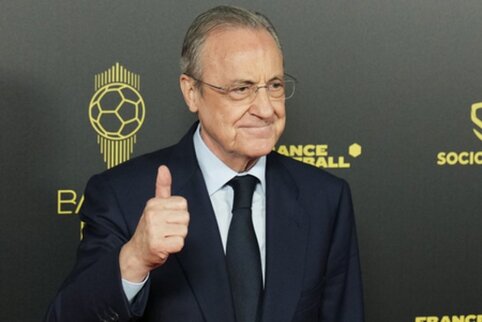
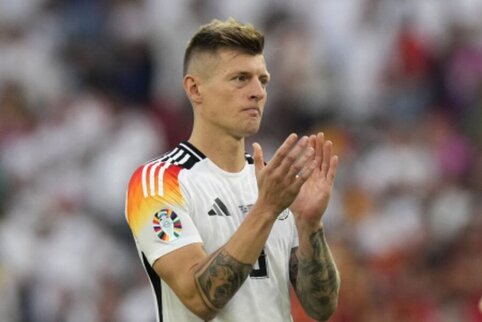

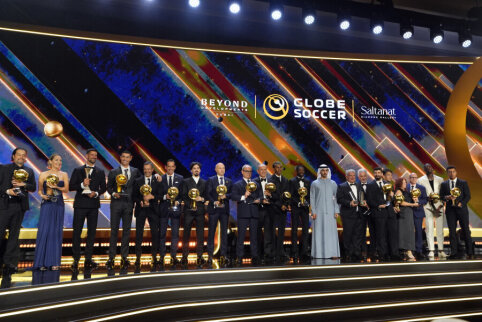
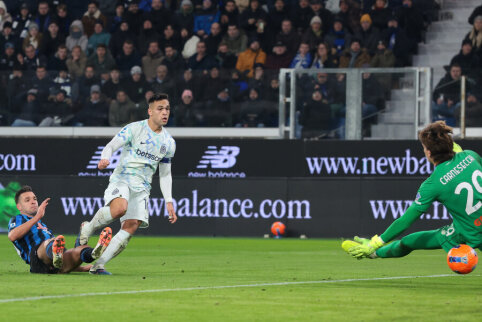
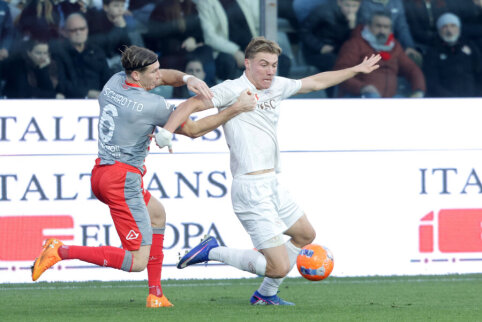
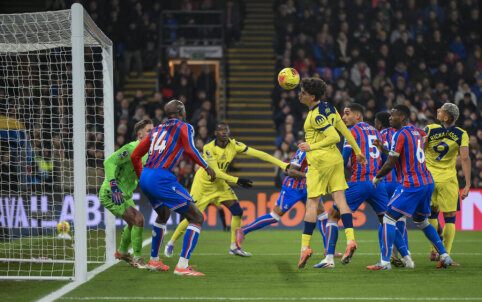
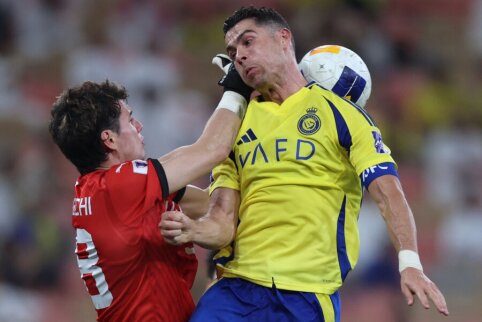



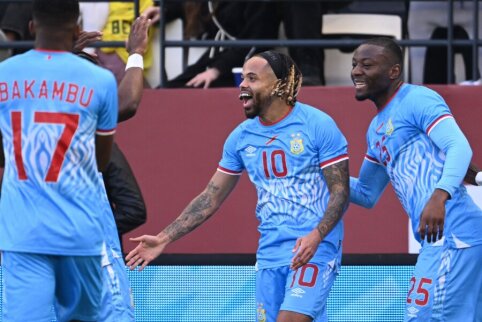
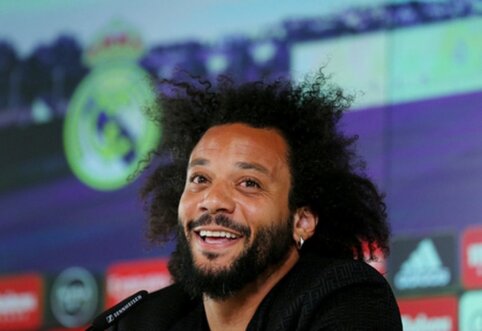
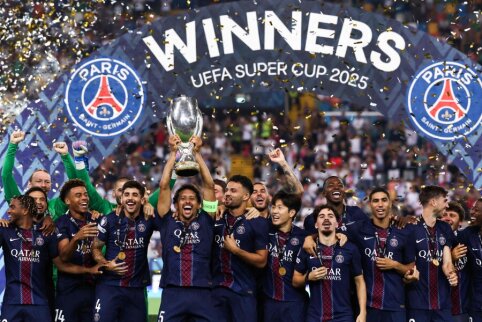
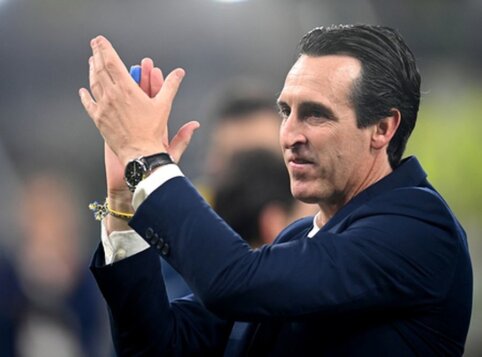
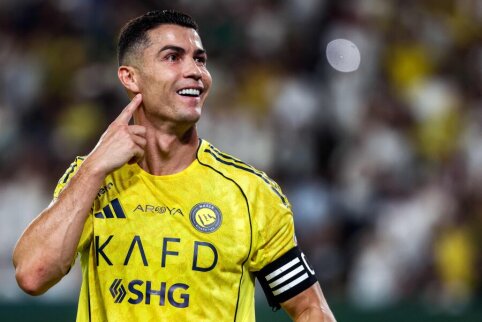
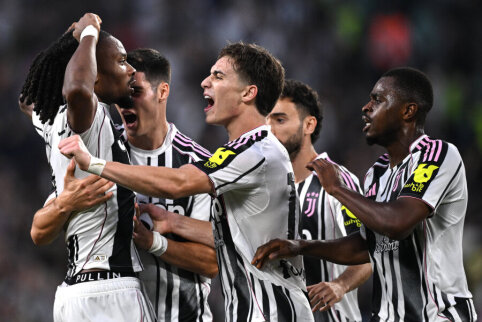
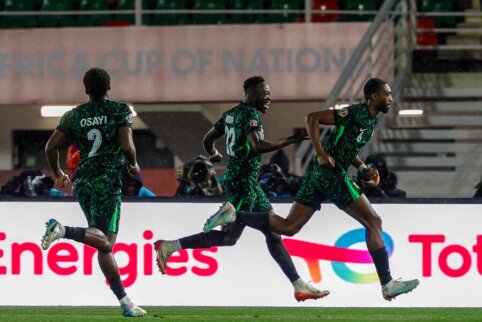

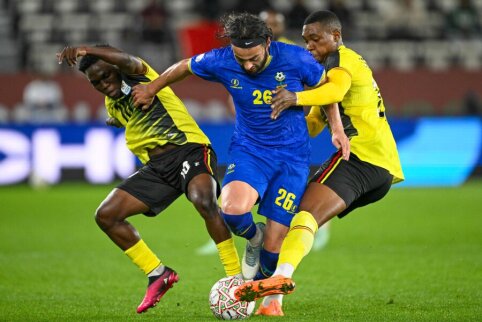
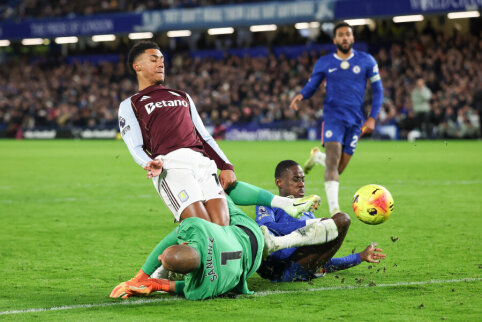
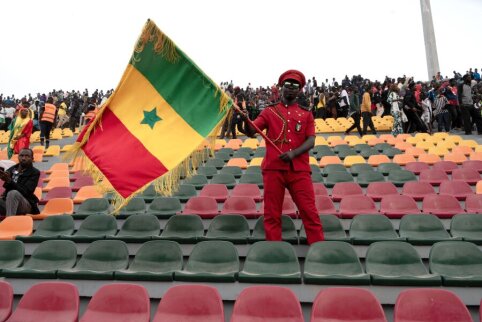
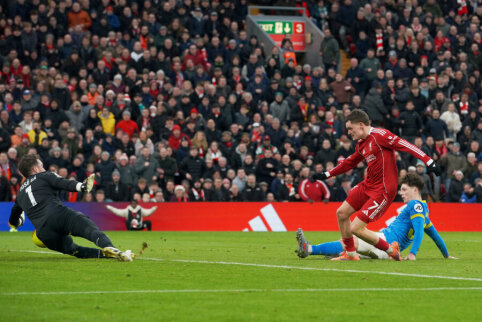

No comments yet...
No comments yet...
No comments yet...
Leave a comment
Cituoti komentarą
Report an inappropriate comment